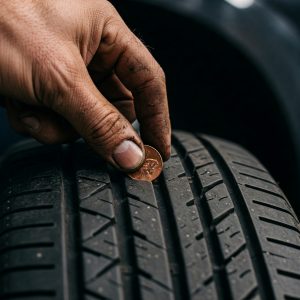Your tires are the only part of your car that physically touch the road, making them one of the most critical components for safety and performance.
Keeping them in top condition isn’t just about extending their lifespan—it’s about ensuring you have the traction and control needed to handle any driving conditions. Worn-out or improperly maintained tires can compromise braking, steering, and stability, increasing the risk of accidents, especially in bad weather.
Ever driven in the rain with bad tires?
If so, you know how nerve-wracking it can be. When your tread is too worn, your tires can’t effectively grip the road, making it easier to hydroplane on wet pavement.
Suddenly, stopping distances increase, turns feel unpredictable, and your car can slide even at low speeds. It’s a recipe for disaster that no driver wants to experience.
That’s why checking your tire pressure, tread depth, and alignment regularly is essential. Properly inflated and well-maintained tires don’t just improve safety—they enhance fuel efficiency, provide a smoother ride, and help your car perform at its best in all conditions.
So, whether you’re driving in the rain, navigating a sharp curve, or making a sudden stop, well-maintained tires ensure you stay in control and keep the ride safe.
Tire Safety 101: How Often You Should Check Your Tire Pressure
It’s like trying to ice skate in socks—you’re going nowhere fast. Check your tire pressure monthly because underinflated tires make handling sloppy and kill your gas mileage, while overinflated tires can turn your ride into a bouncy castle.
Also, pay attention to tread depth. If you can see Lincoln’s entire head when you stick a penny into the tread, it’s time for new tires.

And don’t forget about tire rotation! It’s one of those simple maintenance tasks that can have a huge impact on your driving experience and overall safety. Over time, tires wear down unevenly due to differences in weight distribution, road conditions, and driving habits. If left unchecked, this uneven wear can cause your car to pull to one side, making it harder to steer straight and forcing you to constantly adjust the wheel just to stay in your lane.
Not only is this frustrating, but it also puts unnecessary strain on your steering system and can even reduce the lifespan of your tires, costing you more in replacements down the line. Regularly rotating your tires helps ensure even wear, improves traction, and keeps your ride smooth and stable.
Plus, it enhances fuel efficiency since your engine doesn’t have to work as hard to compensate for uneven grip.
Unless you enjoy feeling like you’re in a constant arm-wrestling match with your steering wheel, it’s best to stick to a consistent tire rotation schedule.
It’s a small effort that goes a long way in keeping your car balanced, responsive, and safer on the road.
Preventing Unnecessary Car Repairs
Knowing when to visit a mechanic is essential for maintaining your car’s health and avoiding costly repairs. If you notice any unusual sounds like grinding, squealing, or knocking from the engine, brakes, or wheels, it’s a good sign that something might be wrong.
Don’t ignore dashboard warning lights, such as the check engine light, oil pressure light, or battery warning; these could indicate serious issues that need professional attention. If your car is handling poorly, such as pulling to one side, vibrating excessively, or making strange noises when turning, it could point to problems with the steering, suspension, or alignment.
Unexplained fluid leaks—whether it’s oil, coolant, or transmission fluid—are another red flag. Lastly, if your car is experiencing performance issues like difficulty starting, stalling, or reduced power, it’s time to consult a mechanic before the problem worsens.
Regular check-ups, even when everything seems to be running perfectly, are essential for catching minor issues before they turn into costly or dangerous problems. Just like routine doctor visits help prevent health complications, consistent vehicle maintenance keeps your car in peak condition and reduces the likelihood of unexpected breakdowns.
Even if your car feels fine, underlying problems—such as a weakening battery, slow fluid leaks, or worn belts—might not be noticeable until they cause a major failure. A quick inspection of essential components like brakes, tires, fluids, and the engine can reveal early warning signs that something needs attention. Addressing these small concerns ahead of time not only prevents costly repairs but also helps maintain optimal performance, fuel efficiency, and overall safety.
Skipping routine maintenance might seem harmless in the short term, but it can lead to expensive surprises down the road.
By staying on top of regular inspections and servicing, you’ll extend your car’s lifespan, avoid unnecessary stress, and ensure that every drive is as smooth and reliable as possible.



